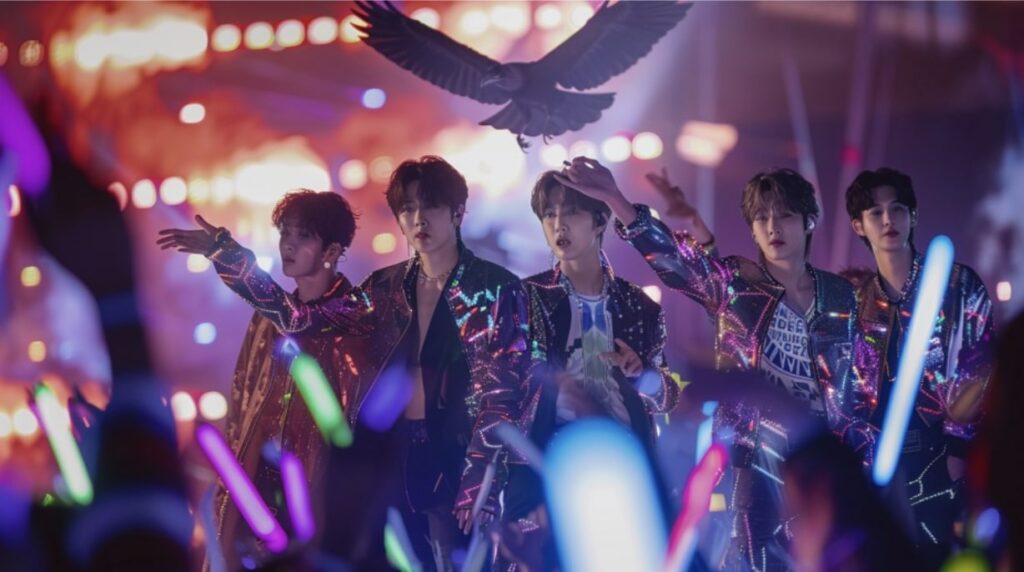K-pop and Precision Canceling: How Narrative Attacks Shape Fan Perception
In the glitzy world of Korean Entertainment, celebrities face a new threat: Precision canceling fueled by narrative attacks. Here's how it works, who it impacts, and how to protect your brand against it.

Note: Every link in this blog post was checked using Compass by Blackbird.AI.
The global rise of Korean music (known as K-pop) catapulted groups like BTS and SEVENTEEN to international stardom. But behind the glitz is a darker side: The phenomenon of “precision canceling.” This tactic, wielded by obsessive fans and bad actors alike, threatens to upend careers and reputations in an industry where image is everything. As the Hallyu, the Korean Wave, continues to surge, we delve into the complex realities facing K-entertainment stars, their devoted—sometimes dangerously so—fanbase, and the harmful narratives that can impact them.
In 2023, the Korean entertainment industry surpassed $52.8 billion in annual revenue. K-pop groups have held numerous global concerts, increasing their worldwide popularity, and that number is expected to increase in 2024. For example, BTS has over 60 million social media followers, while BLACKPINK and TWICE have over 50 million followers on various social media platforms. K-pop album sales reached an impressive 115 million units. To reinforce its commitment to K-dramas, Netflix pledged $2.5 billion for Korean content over the next four years, solidifying South Korea’s role as a crucial hub in its global content strategy. These figures demonstrate the industry’s significant economic and cultural influence and the devoted fan bases worldwide, as well as the challenges stars face in managing their public image and privacy in the spotlight.
LEARN: What Is Narrative Intelligence?
I’ve been a fan of K-pop for seven years. I’ve dedicated most of my Spotify to K-pop artists because I enjoy the music, the dancing, and the positive messages from the groups. You can be whoever you want and dress however you want because everyone is a part of the community. I wanted to write this blog to help protect the K-pop artists and the communities they represent.
While many fans express their appreciation for K-entertainment stars through respectful admiration and support by watching their shows, watching music videos, and attending concerts, a small yet concerning subset known as sasaengs takes this devotion to extreme and harmful levels. These overzealous individuals blur the lines between fandom and obsession, often engaging in invasive and illegal behaviors that can severely impact celebrities’ lives. Unlike typical fans, sasaengs often stalk idols, violate privacy, and spread damaging rumors, posing severe threats to mental health and careers in South Korea’s image-conscious entertainment scene. This stark contrast illuminates the complex realities of celebrity culture within K-entertainment.
Moreover, controversies can arise from past actions or management decisions, amplified by digital media’s relentless scrutiny. Celebrities and companies navigate these challenges through public apologies, policy reforms, and efforts to dispel misinformation that can unfairly tarnish reputations. These challenges highlight the careful balance K-entertainment figures and entities must maintain to protect their image and industry connections, especially considering the risk of ‘cancel culture’ fueled by social media narrative attacks.
Precision canceling is a new tactic that obsessive fans or bad actors use to target high-profile individuals or brands with narrative attacks and false information. These threat actors often uncover damaging information or create rumors that negatively impact a brand or individual’s reputation. The rapid spread of narrative attacks intensifies this phenomenon through social media platforms. As a result, it is crucial for fans, idols, actors, and companies to carefully context-check information before accepting it as truth, with careers potentially hinging on the ability to discern truth from fabrication.
To explore the complex impact of precision canceling, let’s look at eleven harmful narratives from K-entertainment that illustrate its varied forms and consequences.
Narrative 1: Seventeen x AI Controversy
The Seventeen x AI controversy highlights the critical role of effective communication in managing precision canceling within K-entertainment. A BBC article alleged that Seventeen used AI to create music, sparking controversy. However, Seventeen’s member-producer Woozi and their management agency, PLEDIS Entertainment, swiftly refuted these claims with a counter-narrative emphasizing that all their music is created by humans. Woozi clarified on Instagram that while he has explored AI technology, it hasn’t been used in their songwriting. PLEDIS supported this, prompting the BBC to update the article. Initially, fans perceived the media outlet’s treatment as dismissive, leading to significant backlash and shedding light on the music industry’s ongoing debate over the role of technology in music creation. This incident underscores the importance of addressing precision canceling through prompt and targeted counter-narratives to reduce the risk to the brand. Seventeen’s proactive communication via social media effectively countered the AI allegations, preserving their reputation for authentic musicianship. This approach demonstrates the significance of rapid and transparent communication in safeguarding artist credibility amidst industry scrutiny and fan expectations. It also highlights Seventeen’s role as a truly self-made group, maintaining creative control and artistic integrity.
Narrative 2: False Claim about BTS and Military Enlistment:
The narrative around BTS and their military service illustrates the concept of precise non-cancellation in the K-entertainment industry. Despite widespread rumors and public debate, the globally renowned group did not receive a complete exemption from mandatory military service, contrary to some claims. This situation demonstrates how the industry and government carefully navigate high-profile cases, balancing national policy with cultural impact. The decision to have BTS members serve, starting with Jin in December 2022, shows a precise approach to managing public figures’ obligations without granting special treatment that could be perceived as unfair. This nuanced handling allows the group to fulfill their civic duty while maintaining their status and fanbase, effectively avoiding cancellation or special exemption. The case highlights how clarity in decision-making can prevent controversy and maintain legal compliance and public support, even for the most prominent figures in K-entertainment.
Narrative 3: Hyunjin Bullying Allegations:
The narrative of Hyunjin from Stray Kids illustrates a more subtle form of precision canceling in K-entertainment. In early 2021, allegations of school bullying emerged against Hyunjin, sparking a public debate about the relevance of a celebrity’s past actions to their current career. This incident shows how specific accusations can lead to targeted repercussions, even without legal confirmation. JYP Entertainment, Hyunjin’s management, responded with a calculated counter-narrative strategy: Hyunjin issued a public apology, met with his accuser, and took a break for self-reflection—this measured response aimed to address the allegations while trying to preserve Hyunjin’s career. However, the lasting impact of these accusations was evident in March 2024 when fans allegedly demanded his removal from the group, highlighting how targeted canceling can have enduring effects. The Hyunjin case emphasizes the delicate balance K-entertainment personalities must maintain between being held accountable for past actions and being able to continue their careers, as well as the influence of public opinion in shaping these outcomes.
Narrative 4: Kim Garam Alleged Bullying Allegations:
Caption: This claim was checked by Compass by Blackbird.AI.
The Kim Garam narrative involving Le Sserafim illustrates the intricate dynamics of accountability and consequences in the K-pop industry. After facing allegations of school bullying, Garam was promptly removed from the group, and both Source Music and Hybe Corporation terminated her contract. This incident, which occurred shortly after her debut, shows how rapidly public opinion can change in the era of social media. However, the outcomes of similar situations in the broader context of cancel culture in K-pop can vary significantly. For example, while Garam’s career effectively ended, other artists like Hyunjin from Stray Kids returned to their groups after facing similar accusations. This difference in outcomes suggests that the impact of cancel culture is inconsistent and may depend on factors such as the specific allegations, the validity of those claims, the individual’s response, and how the management handles the situation. The Garam incident thus highlights the complex interplay between public opinion, corporate decision-making, and an artist’s career trajectory in the highly scrutinized world of K-pop.
Narrative 5: Kim Seon-Ho Alleged Partner Abuse:
The Kim Seon-ho narrative illustrates precision canceling in K-entertainment, where specific personal issues lead to targeted public backlash. Kim faced intense scrutiny when his ex-girlfriend accused him of emotional abuse and coercing her into an abortion under pretenses. He confirmed and apologized for these allegations, which could have derailed his career. The meticulous nature of this cancellation was further highlighted when Kim’s praise for Nam Joo Hyuk, an actor facing bullying allegations, reignited criticism. Despite this, Kim Seon-ho was forgiven by many due to his sincere apology and a clarifying statement from his ex-girlfriend. Support from colleagues and fans and his talent and professionalism helped shift the focus back to his work. He has since resumed acting with successful projects like “Sad Tropics.” This case underscores how precision canceling in K-entertainment can jeopardize careers based on specific incidents or associations.
Narrative 6: G-Dragon Alleged Drug Controversy:
The narrative of G-Dragon from BIGBANG illustrates a more refined aspect of precision canceling in K-entertainment. In October 2023, G-Dragon from BIGBANG faced serious drug use allegations, which could have led to severe consequences in the industry. However, he was ultimately acquitted of all charges. This case shows how precision canceling can be avoided when allegations are not substantiated. Despite the potential for narrative attacks to trigger cancelation attempts, G-Dragon maintained his career and expanded his professional activities. This incident highlights the industry’s ability to respond when evidence doesn’t support cancelation. It also emphasizes the fine line between accountability and unfair persecution in K-pop, where public perception and legal outcomes can significantly impact careers.
Narrative 7: Seo Ye-ji’s Alleged Mistreatment of Partner and Staff
In the narrative of South Korean actor Seo Ye-ji, the idea of precision canceling is apparent in the precise shifts of her career trajectory. Her career was significantly affected after a series of controversies, including allegations of manipulating her ex-boyfriend and mistreating staff. These incidents prompted a specific and targeted response within the entertainment industry and among the public. Instead of rejecting her entire persona, the consequences were precise: she lost advertising contracts and was removed from ongoing projects. This measured response reflects the Korean entertainment industry’s tendency to address perceived ethical breaches swiftly. Although Seo Ye-ji was not completely shunned, her professional opportunities narrowed significantly, illustrating how modern ‘cancellation’ can involve a calculated reduction of public presence and career prospects rather than complete expulsion from the industry.
Narrative 8: Kim Woojin Alleged Sexual Harassment Accusations
The Kim Woojin narrative illustrates the complexity of precision canceling in K-entertainment, where allegations and narrative attacks can lead to severe consequences. In 2020, an anonymous sexual harassment accusation against an unnamed idol sparked speculation that targeted Woojin, a former member of Stray Kids. Despite his agency providing evidence to refute the claims, the incident triggered a wave of cyberbullying, including the circulation of deepfake nude photos and personal information leaks by a Sasaeng fan. This case demonstrates how quickly narrative attacks and accusations can escalate in the digital age, potentially derailing an artist’s career. Even after the allegations were disproven and legal action was taken against those spreading misinformation, Woojin continued to face hostility from some fans. This persistent animosity highlights the lasting impact of such incidents, showing how precision canceling can occur based on rumors and false information and how challenging it can be for an artist to recover their reputation in the court of public opinion fully.
Narrative 9: JYP Entertainment’s Alleged Mistreatment of GOT7
The GOT7 vs. JYP Entertainment narrative illustrates a nuanced form of precision canceling within the K-pop industry, where fan-driven scrutiny and artist dissatisfaction can lead to targeted consequences for management companies. The controversy revolves around allegations of JYP Entertainment’s insufficient support and mistreatment, resulting in all seven GOT7 members choosing not to renew their contracts. Fans specifically cited grievances such as lack of promotional efforts, mishandling invasive fan behavior, and interference with the group’s creative control. Although JYP’s official statement allegedly did not address these claims, the members’ decisions to sign with different agencies spoke volumes. This case demonstrates how precise canceling can target individuals and corporate entities in the industry. The targeted nature of fan protests and the group’s unified departure allegedly “canceled” JYP’s management of GOT7, prompting a public reckoning with their practices and potentially influencing future artist-company relationships in K-pop.
Narrative 10: SM Entertainment’s Alleged Mistreatment of TVXQ/JYJ
The TVXQ/JYJ vs. SM Entertainment narrative highlights precision canceling in the K-pop industry, shedding light on alleged unfair industry practices affecting individual idols and the industry. The narratives began in 2009 when TVXQ members alleged mistreatment and unfair contract terms by SM Entertainment. Jaejoong, Yoochun, and Junsu (who later formed JYJ) filed a lawsuit against their agency, leading to a court ruling in their favor that canceled their alleged restrictive contracts. However, the precision canceling went beyond contracts, as SM Entertainment allegedly tried to hinder JYJ’s activities in the industry. This prompted intervention by Korea’s Fair Trade Commission, resulting in penalties against SM Entertainment. The case’s impact targeted and canceled alleged exploitative practices, such as “restrictive contracts,” leading to regulatory changes to protect artists’ rights. This form of precision canceling focused on systemic issues rather than individuals, reshaping industry standards and highlighting the power of legal action in addressing deep-rooted problems in the K-pop industry.
Narrative 11: Seungri’s Burning Sun Scandal – Alleged Sex and Drug Abuse
The Seungri scandal, also known as the Burning Sun scandal, demonstrates the phenomenon of precision canceling in the K-entertainment industry. This high-profile narrative unfolded in 2019, centering on former BIGBANG member Seungri and involving serious allegations, including sexual assault, drug distribution, and police collusion. The scandal resulted in Seungri’s conviction on multiple charges, leading to a prison sentence and effectively ending his career in K-pop. The case’s ongoing impact, recently highlighted by a BBC documentary, shows how specific incidents can lead to the targeted removal of individuals from the industry. This precision canceling goes beyond the primary figure, affecting other celebrities and revealing systemic issues within the entertainment world. The scandal’s lasting influence demonstrates how a single case can trigger widespread scrutiny, reshape public perception, and compel the industry to confront deep-rooted problems of exploitation and corruption, ultimately resulting in the targeted “cancellation” of those involved.
The Way Forward
Precision canceling in K-entertainment is a double-edged sword: using accurate information can swiftly deal with harmful narratives that risk brand reputational and career damage. However, if narrative attacks are involved, it may lead to a brand’s downfall. This reflects the industry’s push to uphold ethical standards amidst intense public scrutiny and the rapid spread of misinformation. Balancing accountability and fairness is challenging, alongside combating harmful narratives. Progress hinges on adopting more intricate approaches to addressing misconduct, deploying reliable narrative intelligence to counter misinformation, and enhancing media literacy among fans. By verifying information and promoting redemption, K-entertainment can transform precision canceling into a tool for positive change, thereby maintaining integrity, fostering growth, and safeguarding against digital manipulation.
To learn how Blackbird.AI detects precision canceling through narrative intelligence, book a demo.
Keira Lowden •
Need help protecting your organization?
Book a demo today to learn more about Blackbird.AI.



